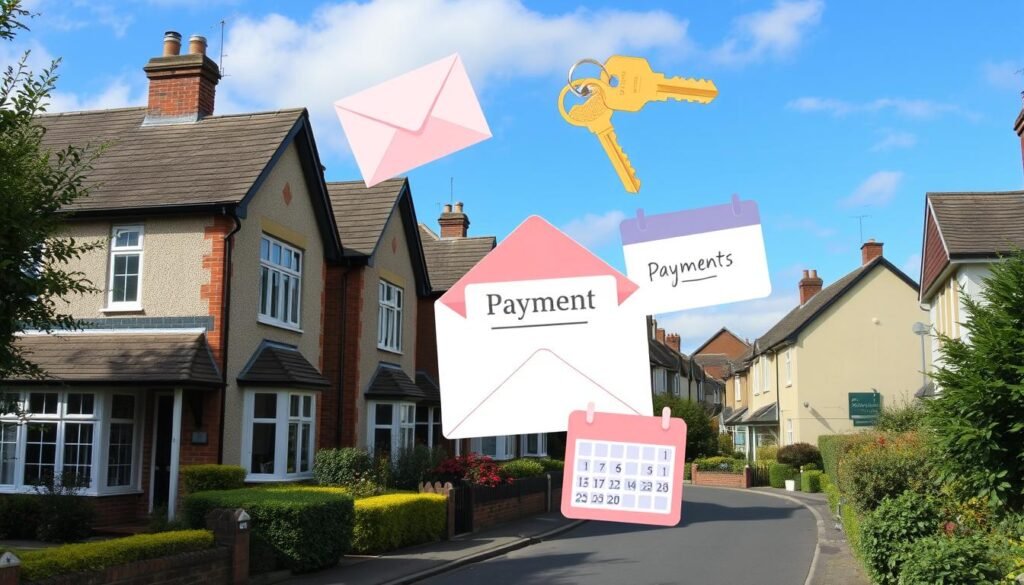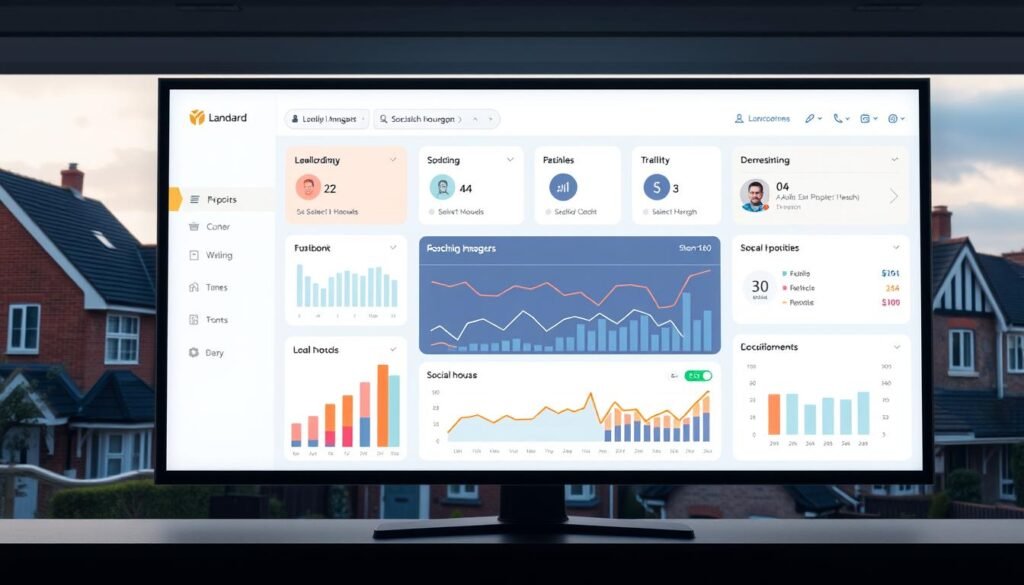Are you a landlord dealing with Universal Credit and direct rent payments? This 2024 guide aims to clear up the confusion. It will help you understand the system better.
Universal Credit was introduced in 2013. It combines six benefits into one. This change affects both tenants and landlords, especially with housing benefit and rent payments.
For landlords, knowing about Universal Credit direct payments is key. The system now offers Alternative Payment Arrangements (APAs). These include managed payments to landlords in certain cases. This guide will explain who can get these payments, how to apply, and how to manage them.
We’ll look at the Landlord Portal system for social housing providers. It’s a tool that makes checking rent and supporting tenants easier. You’ll learn about processing times, bank transfers, and handling rent arrears through direct payments.
This guide is for both private landlords and social housing providers. It covers what you need to know about application procedures. We’ll also discuss recent changes and improvements to Universal Credit direct payments.
Key Takeaways
- Universal Credit consolidates six benefits into one payment
- Alternative Payment Arrangements allow direct rent payments to landlords
- The Landlord Portal system streamlines processes for social housing providers
- Eligibility criteria and application procedures differ for private and social landlords
- Recent system improvements aim to enhance the direct payment process
- Understanding the arrears recovery process is crucial for landlords
- Stay informed about legislative changes affecting Universal Credit payments
Understanding Direct Payments to Landlords Under Universal Credit
Universal Credit has changed how we support housing. It now offers direct payments to landlords for vulnerable tenants. This helps those who find it hard to pay rent.
What Are Alternative Payment Arrangements (APAs)
APAs let housing costs go straight to landlords when tenants can’t manage their money. It stops rent arrears and helps both sides. The latest survey shows 24% of private renters get housing support, up from 20% in 2017/18.
Eligibility Criteria for Direct Payments
To get direct payments, tenants must show they can’t manage their money. They must also have a history of rent arrears. And they must be seen as vulnerable, like those with mental health issues or addiction.
Landlords can ask for APAs through the Landlord Portal if they worry about a tenant’s rent payment. Now, 43% of landlords have Universal Credit claimants, up from six years ago.

Payment Frequency and Timelines
Direct payments have a set schedule:
- Payments are made monthly, matching the Universal Credit cycle
- Landlords get payments by BACS transfer
- Up to three deductions can be taken from each payment
- Arrears payments are made every 28 days
Landlords must tell Universal Credit about any changes quickly. This avoids deductions or payment problems. It helps keep both tenants and landlords stable, reducing evictions due to rent arrears.
The Landlord Portal System for Social Housing Providers
The Landlord Portal is a big change for social housing providers in the UK. It makes it easier to check rent and help tenants. This helps landlords deal with Universal Credit claims better.

Social housing providers can quickly check tenant housing costs with the portal. It lets them ask for direct rent payments easily. This helps avoid money problems. The portal is easy to use and has different levels for different roles.
Key features of the Landlord Portal include:
- Secure tenant information management
- Streamlined rent verification process
- Direct payment request functionality
- Arrears deduction management
A study by the Department for Work and Pensions showed landlords like the Landlord Portal. They say it helps them handle Universal Credit better. The portal makes checking rent and supporting tenants easier for many.
The portal is safe, with strong security like two-factor authentication. It also needs regular updates to keep working well. This lets social housing providers focus on helping tenants and managing rent well.
Application Process for Direct Rent Payments
The process for direct rent payments under Universal Credit has several steps. Both landlords and tenants need to follow these steps carefully. This ensures smooth transactions and keeps housing arrangements in order.
ADRP Forms and Documentation
Landlords start by filling out Alternative Payment Arrangement (APA) request forms. These forms need key details like tenant reference numbers and housing costs. It’s important to fill these out correctly for quick processing.
Bank Transfer Procedures
After approval, the bank transfer process begins. Landlords must give the right banking information. The Department for Work and Pensions (DWP) then sets up the direct payment system. This means rent is paid straight from the tenant’s Universal Credit to the landlord’s account.
Processing Timeframes
The time it takes to process direct rent payments varies. It can be a few days to a few weeks. This depends on the case’s complexity and the information given. Landlords should be ready for this wait and plan ahead.
| Stage | Estimated Timeframe |
|---|---|
| ADRP Form Submission | 1-2 days |
| DWP Review | 5-10 working days |
| Bank Transfer Setup | 3-5 working days |
| First Payment Receipt | Next Universal Credit payment date |
Knowing these steps and timeframes helps landlords and tenants. It makes the application process smoother. This ensures a better transition to direct rent payments under Universal Credit.
Universal Credit Direct Payment to Landlords: Complete Guide 2024
The way Universal Credit and direct payments to landlords work is changing in 2024. This guide helps landlords understand the new rules and how to handle Universal Credit payments well.
A study by the Department for Work and Pensions looked at Universal Credit’s effect on rent arrears. It involved eight social landlords in England and Wales. The study covered 15,750 social housing tenants from 2014 to 2019.
Here are some important findings:
- Some tenants who paid on time were still seen as in arrears because of payment schedule issues
- APAs were seen as helpful by tenants who were struggling financially
- The Landlord Portal was useful for managing APAs and Universal Credit
- Having stable finances and previous housing benefits helped tenants pay rent
For 2024, landlords need to know:
- Universal Credit claims can now take up to 5 weeks for the first payment
- Housing Benefit still applies for 2 weeks after applying for Universal Credit
- Direct payments to landlords are an option for tenants who struggle with money
- The Department for Work and Pensions often checks housing costs with landlords, which can cause delays
| Key Universal Credit Changes | Impact on Landlords |
|---|---|
| Monthly payments in arrears | Potential increase in rent arrears |
| Direct tenant payments as default | Need for robust rent collection strategies |
| Alternative Payment Arrangements | Opportunity for direct rent payments in certain cases |
| Landlord Portal improvements | Enhanced communication with DWP |
It’s important for landlords to keep up with these changes in 2024. They need to stay informed and talk regularly with tenants. This will help manage payments and reduce arrears.
Managing Rent Arrears Through Direct Payments
Dealing with rent arrears can be tough for landlords. The direct payment system is a good way to handle this problem. It helps landlords get a steady income.
Creditor Reference Numbers
Creditor reference numbers are key for tracking payments. Landlords need to give these numbers when asking for rent arrears deductions. They help the Department for Work and Pensions (DWP) make sure payments go to the right accounts.
Arrears Recovery Process
The process for recovering arrears through direct payments has rules. Landlords can ask for extra payments from the tenant’s Universal Credit if two months’ rent is owed. The most they can take from other benefits like pension credit or ESA is £4.25 a week.
Payment Schedules for Arrears
Payment plans for arrears depend on the debt and the tenant’s situation. The aim is to balance debt recovery with the tenant’s financial stability. Landlords should work with the DWP to set fair payment plans. This ensures steady recovery without hurting the tenant too much.
For tenants struggling, Discretionary Housing Payments (DHPs) can help. These payments can last up to 26 weeks for Housing Benefit recipients and 6 months for Universal Credit claimants. They can help cover rent shortfalls and stop arrears from growing.
Tenant Responsibilities and Verification Process
Universal Credit claimants have important duties as tenants. The verification process checks the accuracy of housing costs. This helps both tenants and landlords.
In January 2024, Universal Credit supported 6.4 million people. This shows how big its impact is.
Claimants must give exact details about their rent. This info is checked against what landlords say. If there are problems, tenants might need to do extra work.
Tenants get notices about changes in their housing costs. It’s key to check these updates and talk to the landlord about any issues. This keeps the Universal Credit system working well and ensures payments are right.
| Universal Credit Statistics (January 2024) | Value |
|---|---|
| Total Claimants | 6.4 million |
| Weekly New Claims | 49,000 |
| Weekly Benefit Starts | 39,000 |
| Claimants Not Seeking Employment | 37% |
The verification process is key to the system’s success. It stops mistakes and makes sure support goes to those who need it. By doing their part, tenants help the Universal Credit system work better.
Private Landlord vs Social Housing Provider Requirements
The way Universal Credit is paid out changes a lot between private landlords and social housing providers. This change affects who can get help, how to apply, and how payments are made to tenants getting housing benefits.
Eligibility Differences
Social housing providers can only use the Landlord Portal system. Private landlords, who might work with letting agents, have to follow different rules. Both groups are not allowed to discriminate against tenants who don’t have a DSS (Department for Work and Pensions) number.
Application Procedures
Private landlords might ask for two months’ rent upfront or a guarantor from tenants. Social housing providers have a more set process. They will ask for official data starting in 2024/25.
Payment Processing Variations
Universal Credit for private renters changed in April 2024, after a four-year wait. Social housing providers need to update their records with new tenancy details. They must say what kind of rent the property is, like Social Rent or Affordable Rent.
| Aspect | Private Landlords | Social Housing Providers |
|---|---|---|
| Portal Access | No dedicated portal | Exclusive Landlord Portal access |
| Tenant Screening | May request credit checks | Standardised application process |
| Data Submission | Not required | Mandatory online submission |
| Rental Types | Market rates apply | Various types (e.g., Social Rent, Affordable Rent) |
Changes and Updates to the Direct Payment System
The Universal Credit direct payment system has seen big changes since 2013. These updates aim to make the system better and solve problems for landlords and tenants.
Recent Legislative Changes
In April 2020, the government ended the five-year freeze on local housing allowance (LHA) rates. This change was to make landlords more confident in renting to those on benefits. But, recent data shows LHA rates now only cover 18% of the cheapest private rents. This shows a big gap between housing support and actual rent costs.
System Improvements
The Department for Work and Pensions has made several improvements to the direct payment process. These include:
- Enhanced functionality of the Landlord Portal for social housing providers
- Streamlined verification procedures for tenants and landlords
- Improved communication channels between claimants and the DWP
Future Developments
Welfare reform is still shaping the Universal Credit landscape. Future developments might include:
- Further integration of private landlords into the direct payment system
- Improved data sharing capabilities between relevant agencies
- Refinements to the Migration Notice process, which aims to transition remaining legacy benefit recipients to Universal Credit by 2028
As the system evolves, landlords and tenants need to keep up with these changes. This will help them navigate the Universal Credit direct payment process better.
Troubleshooting Common Direct Payment Issues
Landlords often face payment issues with Universal Credit direct payments. It’s important to know how to solve these problems. This guide will help you deal with payment challenges.
Delayed verifications can be stressful. Keep all communications with Universal Credit on record. If there’s a delay, call the Universal Credit helpline quickly. Have your tenant’s details and any reference numbers ready to help speed things up.
Discrepancies in housing costs are common too. Check your tenant’s information often to make sure it’s right. If you find an error, report it right away. This can stop payment delays and save you from a lot of trouble.
Technical problems with the Landlord Portal can also cause issues. Try clearing your browser cache or using a different browser if you have trouble. If the problem persists, contact landlord support. They can help fix technical issues and keep payments flowing smoothly.
| Common Issue | Troubleshooting Step |
|---|---|
| Delayed Verifications | Contact Universal Credit helpline with tenant details |
| Housing Cost Discrepancies | Review and update tenant information regularly |
| Landlord Portal Glitches | Clear browser cache or use alternative browser |
Keeping accurate records and reporting problems quickly is crucial. By following these steps, landlords can avoid payment problems and make direct payments smoother.
Conclusion
The Universal Credit direct payment system has changed how landlords in the UK get rent from tenants on benefits. This 2024 update to our landlord guide covers important points. It shows why knowing who can get help and how to apply is key for both private and social housing providers.
For social housing providers, the Landlord Portal makes managing Universal Credit payments easier. It helps with Alternative Payment Arrangements (APAs) and dealing with rent arrears. Private landlords can also get direct payments through the ADRP form process, even without the portal.
As Universal Credit changes, it’s vital to keep up with new rules and system updates. This guide is a detailed resource for landlords dealing with direct payments in 2024 and later. By using the advice and strategies here, landlords can improve their financial management and support their tenants better.




